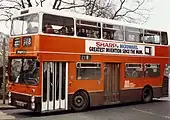Bus doors are of various types of buses with doors including conventional doors, folding doors, sliding plug doors, coach doors and inward gliding doors.
Conventional door
A conventional door, also known as a regular door or vehicle door is a type of door that is hinged at the front-facing edge of the door, and so allows the door to swing outward from the hull of the bus. These doors are relatively safe, in that if they are opened during forward motion of the vehicle, the wind resistance will work against the opening door, and will effectively force its closure.
- Conventional doors
.JPG.webp) Passenger side Mercedes-Benz O 309
Passenger side Mercedes-Benz O 309 Driver side Iveco 370
Driver side Iveco 370
Folding doors
A folding door can have an electric folding door mechanism or manually operated. It is widely used on some older model city buses, mini-buses and school buses that have no air sources. Its features a whole frame design which can give it superior performance and excellent durability. It can be used in extremely hot and cold climates.
- Folding doors
 Folding doors (four leaves)
Folding doors (four leaves) A Turkish bus with folding doors
A Turkish bus with folding doors
Sliding plug doors
Sliding plug doors open by sliding horizontally, whereby the door is either mounted on, or suspended from a track. They are also used on commercial vans, trains and other vehicles. They allow a large opening for passengers to enter or exit without obstructing access.
- Sliding plug doors
%252C(cropped).jpg.webp) Sliding plug doors on a London bus
Sliding plug doors on a London bus Double panel with wheelchair lift extended
Double panel with wheelchair lift extended
Coach doors
- Coach doors
 Both Single and double paneled
Both Single and double paneled Single paneled
Single paneled
Inward gliding doors
Inward gliding doors combine rotary and linear movements to glide the door wings to the side of the doorway as they open.
- Inward gliding doors
 Inner gliding door (single panel)
Inner gliding door (single panel).JPG.webp) Inner gliding doors (double panel)
Inner gliding doors (double panel)(doors).JPG.webp) Closed inner gliding doors (double panel)
Closed inner gliding doors (double panel)_TP2726_%2540_Curtin_University_Bus_Station_(cropped).jpg.webp) Inner gliding doors (two leaves)
Inner gliding doors (two leaves)